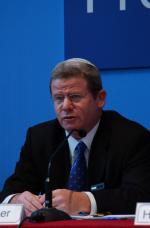
Good morning ladies and gentlemen.
My name is Oded Wiener from the Chief Rabbinate of Israel. I thank you for participating with us in our interesting discussion.
Before we shall start, I would like to pay tribute to the community of Sant' Egidio, our hosts.
I have had the privilege of participating in several conferences organized by the Sant’Egidio community, and there is no question of their significant contribution to awareness and understanding among religions, through productive dialogue and individual face-to-face meetings between leaders from the various religions .
This important conference, expresses the desire that we all share to use dialogue to bring about an exalted and better world, for the benefit of the entire human race .
There is no doubt that the topic we are discussing today :
The rise of Artificial intelligence - opportunities and challenges, is a fascinating subject that is at the beginning of its development. It has tremendous potential for humanity, but also many risks, if it is used for problematic purposes .
There are still many aspects that we do not know about AI, and there is an urgent need to investigate and learn more about its full range of possibilities .
Due to the importance of this issue, we gathered in Rome in January of this year, the most senior representatives of the Pontifical Academy for life, of the Vatican – at the initiative of the president of the academy, Archbishop Paglia, the Chief Rabbinate of Israel, and Abu Dhabi Forum for Peace, together with the world's leading companies in the field of computers: Microsoft, IBM, FAO, and expert professors from the Academy, to bring the moral position of the Abrahamic religions to the issue. To offer methods of testing and treatment with the required sensitivity .
As an opening to our discussion, I want to share with you few paragraphs from this historical and important document :
AI Ethics: An Abrahamic Commitment to the Rome Call
The development of Artificial intelligence (AI) is already changing lives across the world.
As its power grows, this change will prove as great as the industrial revolution, changing the nature of work, the possibilities of manufacture, and opening possibilities to deal with humanity’s great challenges. But all great changes bring the capacity for good and for harm. Whether the development of AI is truly beneficial to all, is in our hands.
In February 2020, a group of organizations led by the Vatican signed in Rome a “Call for AI Ethics”, seeking to foster an ethical approach to AI. The Rome Call sought to promote a sense of responsibility among governments, businesses and institutions to think carefully about the ethical development of AI technologies, serving human creativity and respecting human dignity.
If such action waits until the potential of new AI technologies is realized, it is too late.
As religious leaders, we seek human flourishing because we are commanded to, by our creator.
We, representatives of the Chief Rabbinate of Israel’s Commission for Interreligious Relations, the Pontifical Academy for Life and Abu Dhabi Forum for Peace, having deliberated on:
Recognized and accepted that voluntary regulation is insufficient for the scale of technological progress, and that new forms of international regulation must be encouraged to promote transparency and compliance with ethical principles.
We stand together to do our utmost to work for peace and to avoid future exploitation of religions and their believers.
Committed ourselves to promote “algorethics”, namely an ethical framework for the development and use of AI, by means of the following principles:
1. Transparency: on principle, AI systems must be clear and explicable.
2. Inclusion: the needs of all human beings must be taken into consideration so that everyone can benefit, and all individuals can be offered the best possible conditions to express themselves constructively .
3. Responsibility: those who design the use of AI should do so in a responsible manner, in a reliable way, and with integrity. Development should strive to be fair, honest, and protect human dignity .
4. Security and privacy: AI systems must ensure security and respect the privacy of all users.
In this forum we will navigate the landscape of AI, examining the vast opportunities it brings.
We have today the unique opportunity to hear directly from the senior religious leaders, and from experts on this topic of the principles underlying their thoughts and activities on the subject.
I wish now to call upon professor Paolo Benanti …
We call upon all stakeholders, to business, developers, governments, civil society, and academics to – Uphold the algorethics principles, and developing international regulation to maintain them;
We call upon all the governments to refrain from the weaponization of AI, technologies, which threatens the peaceful co-existence of us all.
We urge those engaged in AI research and development to consider the ethical ramifications of any advancements, and to adhere to the principle in areas of moral concern.
In conclusion, we heard today from different perspectives that In the age of AI, we find ourselves standing at the crossroads of unparalleled opportunities and challenges, where technology's potential to shape our future is nothing short of extraordinary.
AI offers the promise of revolutionizing industries, healthcare, and daily life, but it also presents us with profound ethical, societal, and economic challenges.
To face these challenges, we propose the creation of an alliance between technology companies and leaders representing most of the religious and ethical traditions of the world.
On a personal note, I would like to take this opportunity once again , to express my appreciation to our distinguished hosts from Sant’Egidio, who are an endless source of inspiration in their struggle for justice, diversity and world peace.
Thank you very much.
